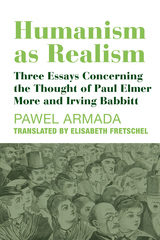286 scholarly books by Haus Publishing and 12
start with R
286 scholarly books by Haus Publishing and 12
286 scholarly books by Haus Publishing
12 start with R start with R
12 start with R start with R
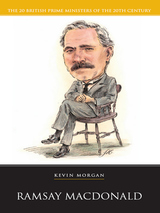
Ramsay Macdonald
Kevin Morgan
Haus Publishing, 2006
The Labour party's first Prime Minister
[more]
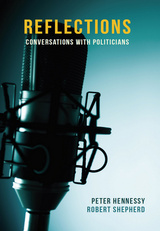
Reflections
Conversations with Politicians
Peter Hennessy and Robert Shepherd
Haus Publishing, 2016
“The historian,” wrote E. L. Doctorow, “will tell you what happened. The novelist will tell you what it felt like.” This book sees Peter Hennessy and Robert Shepard combine both approaches with the art of the interviewer, a craft at once sensitive and probing.
Reflections collects transcripts of the best interviews from the BBC Radio 4 series Reflections with Peter Hennessy, a show on which the British political elite have spoken candidly about their careers and the moments that came to define their political lives. Supplementing the interviews are short biographies and profiles of the interviewees, allowing readers a fuller picture of each speaker’s background and professional trajectory. This revealing book includes conversations with political heavyweights such as former prime minister John Major; former foreign secretaries Margaret Beckett, David Owen, and Jack Straw; Labour Party leader Neil Kinnock; Liberal Party leader David Steel; and chancellor of exchequer Nigel Lawson. In addition, Reflections presents interviews with leading women, including Shirley Williams and Clare Short, who spent years at the forefront of their parties in Westminster.
The latest volume in the popular Haus Curiosities series, Reflections offers valuable insights from some of today’s most influential political figures.
Reflections collects transcripts of the best interviews from the BBC Radio 4 series Reflections with Peter Hennessy, a show on which the British political elite have spoken candidly about their careers and the moments that came to define their political lives. Supplementing the interviews are short biographies and profiles of the interviewees, allowing readers a fuller picture of each speaker’s background and professional trajectory. This revealing book includes conversations with political heavyweights such as former prime minister John Major; former foreign secretaries Margaret Beckett, David Owen, and Jack Straw; Labour Party leader Neil Kinnock; Liberal Party leader David Steel; and chancellor of exchequer Nigel Lawson. In addition, Reflections presents interviews with leading women, including Shirley Williams and Clare Short, who spent years at the forefront of their parties in Westminster.
The latest volume in the popular Haus Curiosities series, Reflections offers valuable insights from some of today’s most influential political figures.
[more]
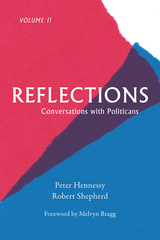
Reflections
Conversations with Politicians Volume II
Peter Hennessy and Robert Shepherd
Haus Publishing, 2019
Accompanying the acclaimed BBC Radio 4 program, Reflections features interviews with twelve of Britain’s most influential political figures from the last twenty years. Presented by Peter Hennessy, one of the UK’s most renowned historians, each interview not only offers an honest and frank assessment of a political career, but also acts as a biography filled with fresh insights and moments of new revelation. From one of the longest-serving Prime Ministers and three of the Conservative leaders who stood against him, to dominant figures of late Thatcherism, stalwarts of successive New Labour cabinets, and leaders of the Liberal Democrats, Hennessy brings his characteristic style to each encounter. The politicians included in this volume are: Tony Blair, Michael Heseltine, Vince Cable, Margaret Hodge, William Hague, Harriet Harman, Michael Howard, Paddy Ashdown, Sayeeda Warsi, David Blunkett, Iain Duncan Smith and Kenneth Baker.
[more]
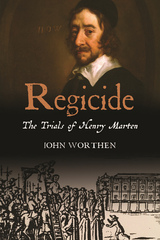
Regicide
The Trials of Henry Marten
John Worthen
Haus Publishing, 2022
An illuminating biography of a republican convicted of regicide, drawing on the letters he wrote from within the Tower of London.
Henry Marten—soldier, member of parliament, organizer of the trial of Charles I, and signatory of the King’s death warrant—is today a neglected figure of the seventeenth century. Yet his life was both extraordinary and emblematic: he was at the fulcrum of English history during the turbulent years of the civil war, the protectorate, and the restoration. Imprisoned in the Tower of London and tried at the Old Bailey, Marten was found guilty of high treason, only to be held captive for years on the equivalent of death row. While he was in prison, his letters to his mistress Mary Ward were stolen and published in an attempt to destroy his reputation. Witty, clever, loving, sardonic, and never despairing, the letters offer a rare and extraordinary insight into the everyday life of a man in the Tower awaiting a sentence of death. The attempt to expose him as immoral revealed him instead as a tender and brave man. In John Worthen’s revelatory biography, Marten emerges from the shadows as a brilliantly clever, lively-minded man, free of the fundamentalist zeal so common in many of his republican contemporaries. Marten never abandoned his beliefs in equality, in a representative parliament under a constitution (which he had helped to write) without a monarch or a House of Lords, and in that way can be seen as a very modern man.
Henry Marten—soldier, member of parliament, organizer of the trial of Charles I, and signatory of the King’s death warrant—is today a neglected figure of the seventeenth century. Yet his life was both extraordinary and emblematic: he was at the fulcrum of English history during the turbulent years of the civil war, the protectorate, and the restoration. Imprisoned in the Tower of London and tried at the Old Bailey, Marten was found guilty of high treason, only to be held captive for years on the equivalent of death row. While he was in prison, his letters to his mistress Mary Ward were stolen and published in an attempt to destroy his reputation. Witty, clever, loving, sardonic, and never despairing, the letters offer a rare and extraordinary insight into the everyday life of a man in the Tower awaiting a sentence of death. The attempt to expose him as immoral revealed him instead as a tender and brave man. In John Worthen’s revelatory biography, Marten emerges from the shadows as a brilliantly clever, lively-minded man, free of the fundamentalist zeal so common in many of his republican contemporaries. Marten never abandoned his beliefs in equality, in a representative parliament under a constitution (which he had helped to write) without a monarch or a House of Lords, and in that way can be seen as a very modern man.
[more]
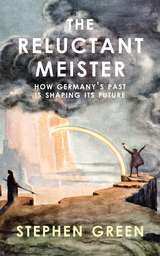
Reluctant Meister
How Germany's Past is Shaping Its European Future
Stephen Green
Haus Publishing, 2014
The Euro crisis has served as a stark reminder of the fundamental importance of Germany to the larger European project. But the image of Germany as the dominant power in Europe is at odds with much of its recent history. Reluctant Meister is a wide-ranging study of Germany from the Holy Roman Empire through the Second and Third Reichs, and it asks not only how such a mature and developed culture could have descended into the barbarism of Nazism but how it then rebuilt itself within a generation to become an economic powerhouse. Perhaps most important, Stephen Green examines to what extent Germany will come to dominate its relationship with its neighbors in the European Union, and what that will mean.
[more]
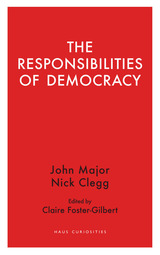
The Responsibilities of Democracy
John Major and Nick Clegg
Haus Publishing, 2019
Democracy operates on consent. That means politicians have an obligation to present and argue their causes in order to ultimately win consensus. Above all, democracy requires honesty—in facing up to challenges, acknowledging fears and dangers, and admitting the limitations of government. But democracy has its flaws, not least in the lack of efficiency in the decision-making process.
Amid pressing questions about the nature and limits of democracy, both in Britain and beyond, The Responsibilities of Democracy provides a clear-eyed perspective shared by two former politicians. Two central figures of the British political establishment, John Major and Nick Clegg, share their thoughts on where democracy is heading and how it can survive in the twenty-first century. Offering his perspective as a former prime minister, Major writes of the qualities on which a healthy democracy depends and expresses his deep concerns about the declining decorum of political exchange. Clegg brings a counter-perspective in discussing the ways in which political language has always involved trading insults and argues that echo chambers, although now more sophisticated, are nothing new. Compromise, Clegg insists, is not betrayal, but is instead the very substance of our politics and our democracy. The Responsibilities of Democracy explores the overall health of UK democracy, giving a balanced analysis of its values and flaws. It is also a clarion call to the electorate and politicians to nurture and protect the precious values on which democracy depends.
Amid pressing questions about the nature and limits of democracy, both in Britain and beyond, The Responsibilities of Democracy provides a clear-eyed perspective shared by two former politicians. Two central figures of the British political establishment, John Major and Nick Clegg, share their thoughts on where democracy is heading and how it can survive in the twenty-first century. Offering his perspective as a former prime minister, Major writes of the qualities on which a healthy democracy depends and expresses his deep concerns about the declining decorum of political exchange. Clegg brings a counter-perspective in discussing the ways in which political language has always involved trading insults and argues that echo chambers, although now more sophisticated, are nothing new. Compromise, Clegg insists, is not betrayal, but is instead the very substance of our politics and our democracy. The Responsibilities of Democracy explores the overall health of UK democracy, giving a balanced analysis of its values and flaws. It is also a clarion call to the electorate and politicians to nurture and protect the precious values on which democracy depends.
[more]

Rida Said
A Man for All Seasons
Sabah Kabbani
Haus Publishing, 2018
Like many founding fathers, Rida Saïd (1876-1946) lived a cosmopolitan life before taking on his monumental contribution to building the modern nation of Syria. Born in Damascus in 1876, Said trained as a medical doctor in Istanbul and Paris. As a young man, he served as a field doctor with the Ottoman Empire’s army in the Balkan Wars, but he soon became disillusioned about his homeland’s foreign rulers. Like other Syrians, he was opposed to the aggressive Turkish nationalism that alienated Arabs and dreamed of a more inclusive system for his people. After his medical work in Damascus during World War I, and following the collapse of the Ottoman Empire, Said took on a critical role in establishing an independent Syria: he became a pioneering educator, advocating for the importance of providing institutions to educate the Arab people. He went on to become the first head of Damascus University, and then Minister of Education. He died in 1945, a few months before Syria finally achieved independence in 1946.
Now available for the first time in English, Rida Saïd: A Man for All Seasons tells the story of this remarkable life at the heart of a nation in deep conflict. Indeed, Saïd’s story resonates profoundly today as the Syrian people struggle for a future of opportunity and respect.
Now available for the first time in English, Rida Saïd: A Man for All Seasons tells the story of this remarkable life at the heart of a nation in deep conflict. Indeed, Saïd’s story resonates profoundly today as the Syrian people struggle for a future of opportunity and respect.
[more]

Riddle, Mystery, and Enigma
Two Hundred Years of British–Russian Relations
David Owen
Haus Publishing, 2022
A history of relations between Britain and Russia from the nineteenth century to the present.
With Riddle, Mystery, and Enigma, statesman and author David Owen tells the story of Britain’s relationship with Russia, which has been surprisingly underexplored. Through his characteristic insight and expertise, he depicts a relationship governed by principle as often as by suspicion, expediency, and necessity.
When the two nations formed a pragmatic alliance and fought together at the Battle of Navarino in Greece in 1827, it was overwhelmingly the work of the British prime minister, George Canning. His death brought about a drastic shift that would see the countries fighting on opposite sides in the Crimean War and jostling for power during the Great Game. It was not until the Russian Revolution of 1917 that another statesman had a defining impact on relations between Britain and Russia: Winston Churchill, who opposed Bolshevism yet never stopped advocating for diplomatic and military engagement with Russia. In the Second World War, he recognized early on the necessity of allying with the Soviets against the menace of Nazi Germany. Bringing us into the twenty-first century, Owen chronicles how both countries have responded to their geopolitical decline. Drawing on both imperial and Soviet history, he explains the unique nature of Putin’s autocracy and addresses Britain’s return to “blue water” diplomacy. Newly revised, this paperback edition features extended chapters on Putin’s Russia and the future of British–Russian relations after the Russo-Ukrainian War.
With Riddle, Mystery, and Enigma, statesman and author David Owen tells the story of Britain’s relationship with Russia, which has been surprisingly underexplored. Through his characteristic insight and expertise, he depicts a relationship governed by principle as often as by suspicion, expediency, and necessity.
When the two nations formed a pragmatic alliance and fought together at the Battle of Navarino in Greece in 1827, it was overwhelmingly the work of the British prime minister, George Canning. His death brought about a drastic shift that would see the countries fighting on opposite sides in the Crimean War and jostling for power during the Great Game. It was not until the Russian Revolution of 1917 that another statesman had a defining impact on relations between Britain and Russia: Winston Churchill, who opposed Bolshevism yet never stopped advocating for diplomatic and military engagement with Russia. In the Second World War, he recognized early on the necessity of allying with the Soviets against the menace of Nazi Germany. Bringing us into the twenty-first century, Owen chronicles how both countries have responded to their geopolitical decline. Drawing on both imperial and Soviet history, he explains the unique nature of Putin’s autocracy and addresses Britain’s return to “blue water” diplomacy. Newly revised, this paperback edition features extended chapters on Putin’s Russia and the future of British–Russian relations after the Russo-Ukrainian War.
[more]
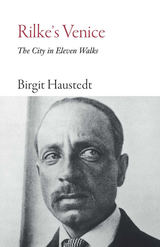
Rilke's Venice
Birgit Haustedt
Haus Publishing, 2019
For the Austrian poet and novelist Rainer Maria Rilke, travel was not only integral to his work, it was a way of life. Venice stands out as a location of particular importance to Rilke, and he visited the city ten times between 1897 and 1920. This city has inspired countless writers and artists, but Rilke, both enthralled and provoked by it, reveals a striking and deeply felt love for the city. He was as eager to explore the city’s underbelly, its deserted shipyards and back alleys, as he was to experience its iconic sights of St. Mark’s and the Doge’s Palace. Staying in both simple guesthouses and the grand palaces of his patrons, Rilke would walk prodigiously. His contemporary Stefan Zweig commented that “knowing every last corner and depth of the city was his passion” and Rilke himself said his walking allowed him to “grasp the whole breadth of the city.”
In eleven walks, Birgit Haustedt guides readers through Venice following the poet’s footsteps. Haustedt invites us to look on the beloved sights of the city through Rilke’s eyes, offering a new vision of this famed destination. Rilke’s Venice provides new insight into one of the finest and most widely recognized writers of the twentieth century. It also acts as a literary travel companion and guidebook to Venice, offering eleven detailed maps of walks through the city.
In eleven walks, Birgit Haustedt guides readers through Venice following the poet’s footsteps. Haustedt invites us to look on the beloved sights of the city through Rilke’s eyes, offering a new vision of this famed destination. Rilke’s Venice provides new insight into one of the finest and most widely recognized writers of the twentieth century. It also acts as a literary travel companion and guidebook to Venice, offering eleven detailed maps of walks through the city.
[more]
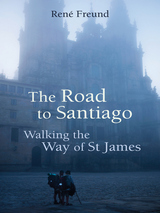
The Road to Santiago
Walking the Way of St James
René Freund
Haus Publishing, 2016
Each year, over 200,000 people pilgrimage to the Cathedral of Santiago de Compostela in Spain. Often called the Way of St. James, this journey has been an important Christian tradition for centuries. The Road to Santiago is one man’s incredible story of walking almost a thousand miles to experience it.
As René Freund learns, when you reach the edge of the European continent having walked along the Way of St. James—which pilgrims of former times thought to be the end of the world—only then do you realize that the old pilgrim’s saying is true: the journey does not end in Santiago. The journey begins in Santiago. In this vivid travelogue, Freund not only introduces us to the overwhelming natural beauty he encountered along the way, but also shares his experience of reaching his physical and psychological limits during the arduous journey.
As René Freund learns, when you reach the edge of the European continent having walked along the Way of St. James—which pilgrims of former times thought to be the end of the world—only then do you realize that the old pilgrim’s saying is true: the journey does not end in Santiago. The journey begins in Santiago. In this vivid travelogue, Freund not only introduces us to the overwhelming natural beauty he encountered along the way, but also shares his experience of reaching his physical and psychological limits during the arduous journey.
[more]
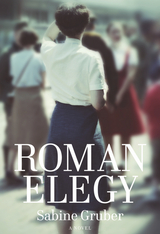
Roman Elegy
Sabine Gruber
Haus Publishing, 2013
It is 2009: writer Clara Burger arrives in Rome to sort out the affairs and clear the flat of her school friend Ines, prematurely dead from cancer. Sorting through Ines's belongings, Clara finds a manuscript containing not only an autobiographical account of Ines's strange experiences while working as a chambermaid in Rome in the summer of 1978, but also the life story of her former employer, the hotelier Emma Manente. Originally from Italy's German-speaking enclave South Tyrol (like Clara and Ines), Emma first comes to Rome in the late 1930s and becomes an eyewitness to the capital's turbulent past and present: Mussolini's fascist regime, the Nazi occupation and an uneasy postwar democracy threatened by corruption and extremism. In a sweeping tale of remembrance and reconciliation, of lives unfulfilled and loves unrequited, Roman Elegy interweaves the personal stories of three resilient women with a fascinating historical narrative of the Eternal City, in all its contrasting squalor and beauty, compassion and savagery.
[more]
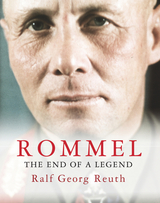
Rommel
The End of a Legend
Ralf Georg Reuth
Haus Publishing, 2019
Erwin Rommel is the best-known German field commander of World War II. Repeatedly decorated for valor during the First World War, he would go on to lead the German Panzer divisions in France and North Africa. Even his British opponents admitted to admiring his apparent courage, chivalry and leadership, and he became known by the nickname “Desert Fox.” His death, in October 1944, would give rise to speculation for generations to come on how history should judge him. To many he remains the ideal soldier, but, as Reuth shows, Rommel remained loyal to his Führer until forced to commit suicide, and his fame was largely a creation of the master propagandist Joseph Goebbels. Stripping away the many layers of Nazi and Allied propaganda, Reuth argues that Rommel’s life symbolizes the complexity and conflict of the German tragedy: to have followed Hitler into the abyss, and to have considered that to be his duty.
[more]
READERS
Browse our collection.
PUBLISHERS
See BiblioVault's publisher services.
STUDENT SERVICES
Files for college accessibility offices.
UChicago Accessibility Resources
home | accessibility | search | about | contact us
BiblioVault ® 2001 - 2024
The University of Chicago Press




